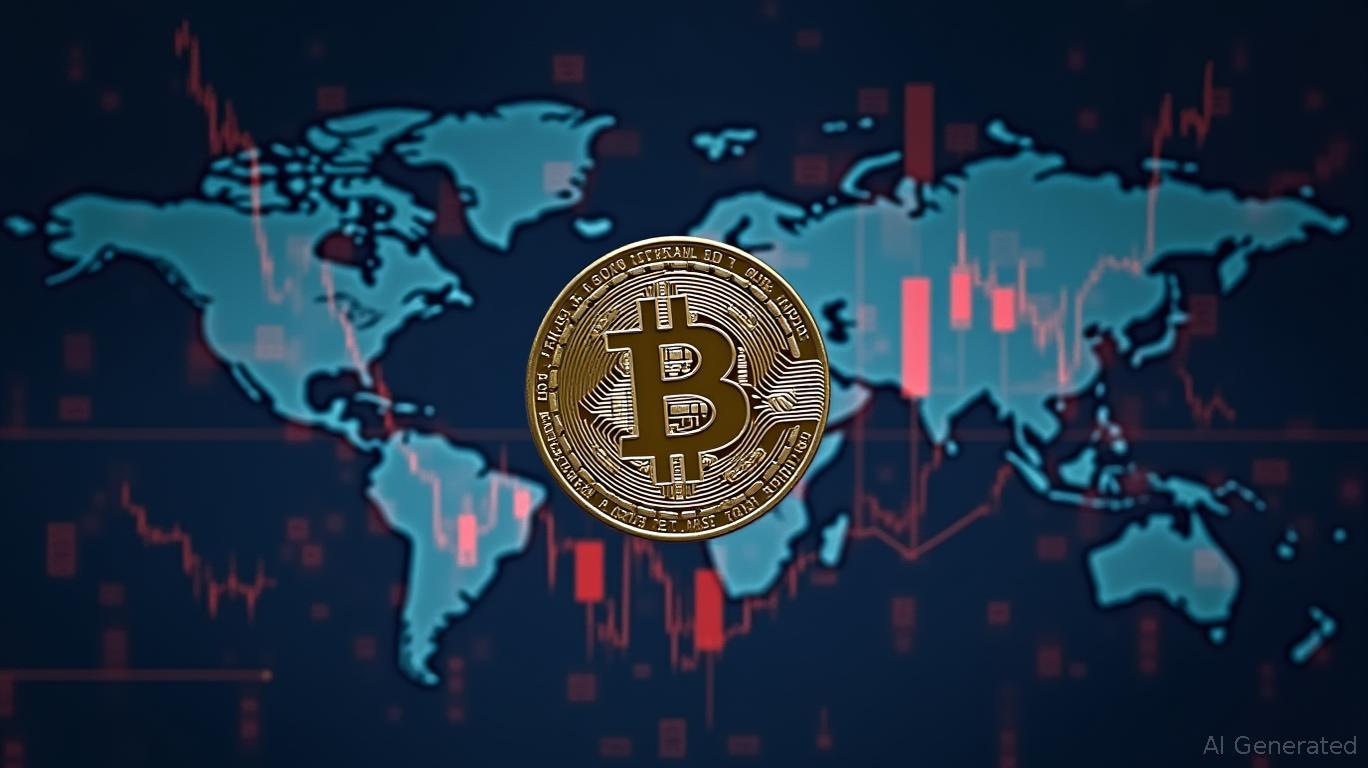Bitcoin Updates: S&P Highlights Bitcoin's Price Swings as Liquidity Concerns Lead to Speculative Grade Rating
- S&P downgrades Strategy to B- due to Bitcoin-centric model, liquidity risks from volatile crypto reserves, and mismatched dollar obligations. - Company holds $8B convertible debt ($5B out-of-the-money) and faces $640M annual dividends, relying on equity sales amid negative cash flow. - Weak capital profile highlighted by -$37M 2025 H1 cash flow and "significantly negative" risk-adjusted capital ratio despite $73B Bitcoin treasury. - Rating warns of downgrade risks if Bitcoin prices fall before 2028 debt
S&P Global Ratings has given Strategy a B- issuer credit rating, classifying it as speculative grade.
This rating points to a "currency mismatch" between Strategy’s debt and dividend commitments, which are denominated in U.S. dollars, and its main asset, Bitcoin. S&P cautioned that this could lead to liquidity issues if Bitcoin’s value drops. The company currently has around $8 billion in convertible debt, with $5 billion of that not currently profitable, and is responsible for $640 million in annual preferred dividends. S&P mentioned that Strategy intends to meet these obligations through at-the-market equity offerings, but stressed that its dependence on capital markets and the volatility of Bitcoin remain significant risks, the report noted.

Although Strategy’s Bitcoin holdings, valued at over $73 billion, greatly surpass its outstanding debt, S&P pointed out that the company’s risk-adjusted capital (RAC) ratio was "significantly negative" as of June 30, 2025. The agency determines this figure by deducting the market risk of Bitcoin from the company’s equity, which weakens its capital standing. Furthermore, Strategy reported a negative cash flow of $37 million for the first half of 2025, with most of its pre-tax income coming from unrealized gains on its Bitcoin assets—holdings that do not produce cash, as the report observed.
The agency also warned that liquidity could become strained if Bitcoin’s price declines before the company’s debt matures in 2028. While S&P recognized Strategy’s track record of careful debt management, it cautioned that a sharp drop in Bitcoin’s value or restricted access to capital markets could lead to another downgrade. On the other hand, an upgrade would require better dollar liquidity, less dependence on convertible debt, and proof of resilience in capital markets during periods of Bitcoin price volatility, according to the Miami Daily article.
Strategy’s business strategy, which centers on acquiring and holding Bitcoin as a reserve asset funded by both equity and debt, has raised concerns about concentration risk. The company also runs a smaller software analytics segment that breaks even, but its focus on Bitcoin largely shapes its credit profile. S&P’s analysis suggested that the rating may attract high-yield, high-risk credit investors, but it also highlights the company’s exposure to market swings, as reported by the same source.
This downgrade occurs as Bitcoin faces heightened market uncertainty and considerable price fluctuations in recent months. While Strategy’s leadership has not issued a statement regarding the S&P rating, they have previously reiterated their long-term belief in Bitcoin as a store of value. According to the report, the company’s future credit outlook will largely depend on Bitcoin’s price stability and its continued access to capital markets despite its speculative nature.
Disclaimer: The content of this article solely reflects the author's opinion and does not represent the platform in any capacity. This article is not intended to serve as a reference for making investment decisions.
You may also like
U.S. and Vietnam Sign Trade Agreement to Offset China and Adjust Trade Relations
- U.S. and Vietnam finalize trade framework to boost commerce, reduce $123.5B deficit, and address market access barriers under Trump's Southeast Asia strategy. - Agreement includes Vietnam lowering tariffs on U.S. industrial/agricultural goods, U.S. granting duty-free access to select products, and resolving non-tariff barriers like vehicle standards. - Mixed market reactions emerge as U.S. agribusiness benefits but Vietnamese-sourced companies face Trump's 20-40% tariffs, complicating supply chains and c

Bitcoin Market Update: Institutional Investments and Easing Inflation Help Steady Crypto Investor Confidence
- Crypto Fear & Greed Index rose to 50 (neutral) on Oct 28, 2025, reversing from "extreme fear" due to institutional inflows and softer inflation data. - Fed policy shifts and Trump's pardon of Binance's Zhao drove Bitcoin's 3.5% weekly gain, while Ethereum faced $169M outflows. - U.S. led $843M crypto inflows, Germany recorded record $502M inflows, and Switzerland saw $359M outflows from provider transfers. - Bitcoin's $931M inflow boosted YTD totals to $30.2B, contrasting with altcoins like Solana ($29.4

Bitcoin Updates: October Sees Bitcoin ETF Investments Face Off Against Global and Economic Challenges
- Bitcoin's October underperformance, far below historical averages, raises concerns over geopolitical tensions and macroeconomic uncertainty. - U.S. spot Bitcoin ETF inflows, led by BlackRock, boosted prices above $126,000 despite volatile swings between $103,500 and $115,000. - U.S.-China trade developments and Fed policy shifts, including potential rate cuts, drive market sentiment and capital flows. - Ethereum faces outflows amid uncertainty over its post-merge roadmap, while altcoins see modest inflow

Bitcoin Updates: Investors Seize Strategic Opportunity as Market Sentiment Levels Off at Neutral
- Crypto Fear & Greed Index stabilizes at 50, marking a neutral stance after months of fear-driven volatility. - The shift reflects balanced investor sentiment, reducing panic selling and enabling strategic market analysis. - Calculated via metrics like volatility (25%), social media (15%), and Bitcoin dominance, the index signals reduced emotional trading. - Analysts highlight neutrality as a window for long-term accumulation but caution against complacency amid regulatory and macroeconomic risks.
